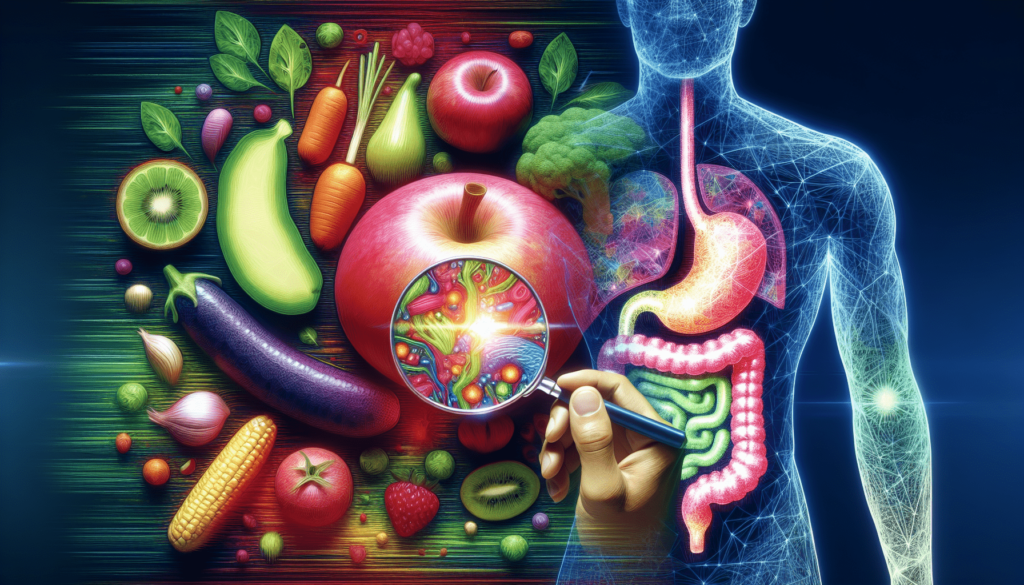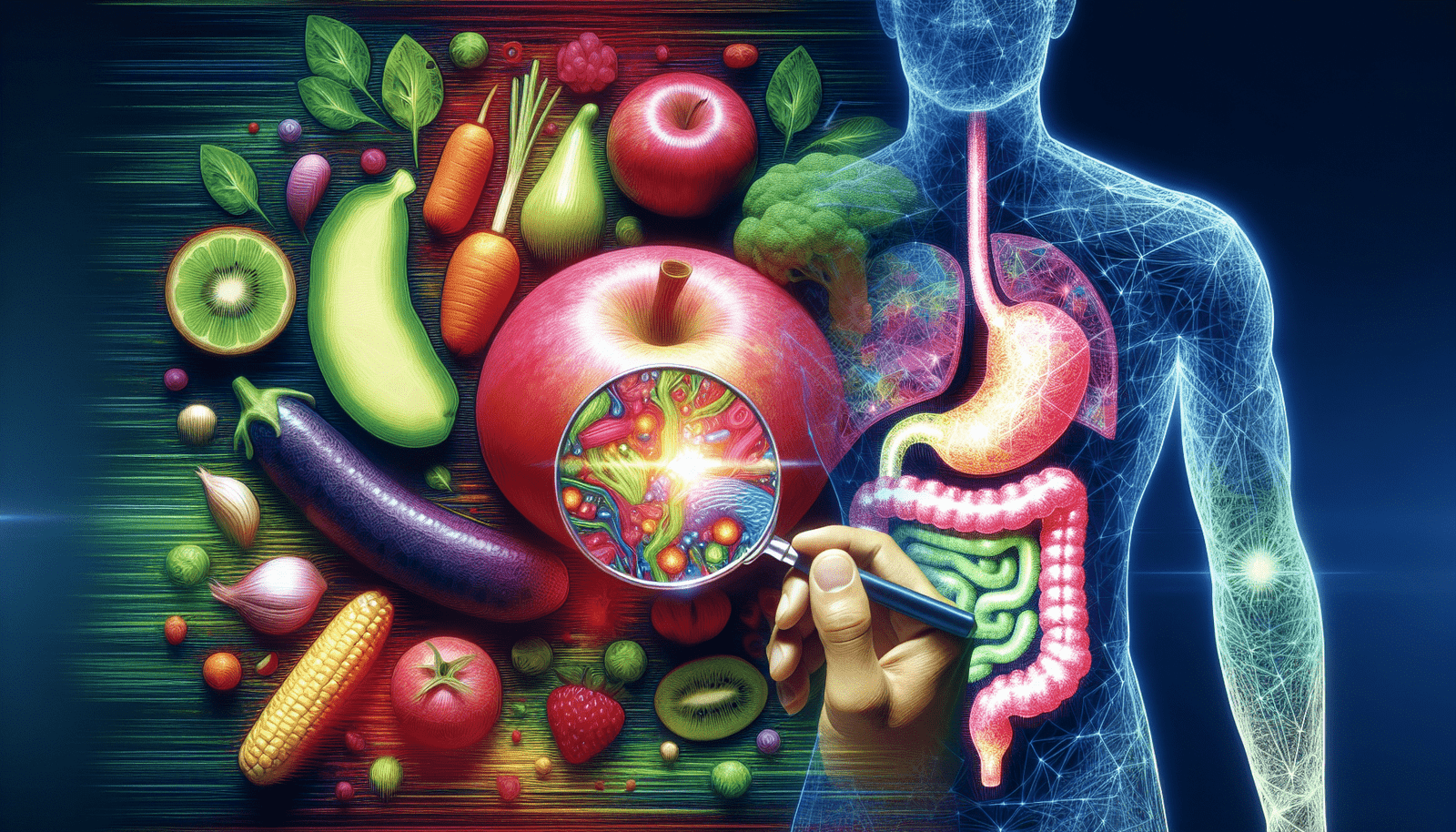Have you ever wondered how the food you eat affects the trillions of microorganisms that live inside your body? In this article, we will explore the fascinating relationship between functional foods and the microbiome. Functional foods are specially formulated to provide health benefits beyond basic nutrition, and they have been shown to play a crucial role in maintaining gut health. By understanding how functional foods interact with the microbiome, we can make informed choices about our diet and potentially improve our overall well-being. So, let’s dive into the world of functional foods and discover their impact on our microscopic friends in the gut!

Introduction to Functional Foods
Definition of functional foods
Functional foods are a category of food products that provide health benefits beyond basic nutrition. These foods are specially designed or modified to contain bioactive compounds that can promote overall well-being and reduce the risk of certain diseases. Functional foods have gained significant attention in recent years, as they offer a convenient way to incorporate health-enhancing components into our diets.
Examples of functional foods
There is a wide range of functional foods available that can be easily incorporated into your daily diet. Some common examples include probiotic yogurts, fortified cereals, omega-3 fatty acid-rich fish, antioxidant-rich fruits and vegetables, and whole grains. These functional foods contain specific bioactive compounds that have been scientifically proven to have a positive impact on human health.
Understanding the Microbiome
Definition of microbiome
The microbiome refers to the complex community of microorganisms, including bacteria, viruses, fungi, and other microbes, that reside in and on our bodies. These microorganisms, particularly those in the gastrointestinal tract, play a crucial role in maintaining our overall health and well-being.
Importance of the microbiome
The microbiome performs a wide array of functions that are essential for our health. It aids in digestion, nutrient absorption, and the synthesis of vitamins and other beneficial compounds. The microbiome also plays a critical role in modulating our immune system, protecting against pathogens, and maintaining a balanced hormonal and metabolic state. Imbalances or disturbances in the microbiome have been linked to various health conditions, including obesity, diabetes, inflammatory bowel disease, and even mental health disorders.
Factors influencing the microbiome
Several factors can influence the composition and diversity of the microbiome. These include genetics, age, diet, lifestyle, medication use, and environmental exposures. Of these factors, diet has a particularly significant impact on the microbiome. The foods we eat can either support the growth of beneficial bacteria or promote the overgrowth of harmful bacteria, ultimately shaping the overall health and functioning of the microbiome.
Functional Foods and the Microbiome
Impact of functional foods on the microbiome
Functional foods have been found to have a direct impact on the composition and activity of the microbiome. Certain bioactive compounds present in these foods can act as prebiotics, probiotics, or promote the growth of specific beneficial bacteria, leading to a healthier microbiome and improved overall health.
Role of functional foods in promoting a healthy microbiome
Functional foods can support a healthy microbiome by providing essential nutrients that contribute to the growth and maintenance of beneficial bacteria. They can also enhance microbial diversity, which is a key indicator of a healthy microbiome. Furthermore, functional foods can inhibit the growth of harmful bacteria and reduce the risk of microbial imbalance or dysbiosis.
Specific functional foods for microbiome health
Many functional foods have been found to have a positive impact on the microbiome. Some examples include fermented foods like yogurt, kimchi, sauerkraut, and kefir, which contain live beneficial bacteria that can colonize the gut and promote microbial balance. Additionally, foods rich in prebiotic fibers, such as onions, garlic, bananas, and asparagus, provide nourishment for the beneficial bacteria in the gut. These foods help create an environment conducive to a healthy and diverse microbiome.

Prebiotics and the Microbiome
Definition and characteristics of prebiotics
Prebiotics are a type of dietary fiber that cannot be broken down by human digestive enzymes but are selectively metabolized by beneficial bacteria in the gut. They serve as food sources for these bacteria, stimulating their growth and activity. Prebiotics are often present in foods like chicory root, Jerusalem artichokes, whole grains, and certain fruits and vegetables.
How prebiotics interact with the microbiome
When consumed, prebiotics reach the colon intact, where they provide nourishment for the beneficial bacteria residing there. These bacteria ferment prebiotics to produce short-chain fatty acids, such as butyrate, acetate, and propionate, which have numerous health benefits. By promoting the growth of these beneficial bacteria, prebiotics contribute to a thriving and diverse microbiome.
Benefits of prebiotics for the microbiome
Including prebiotics in your diet has been shown to have several advantages for the microbiome. Prebiotics help increase the abundance of beneficial bacteria, such as Bifidobacterium and Lactobacillus, while inhibiting the growth of harmful bacteria. They also enhance the production of short-chain fatty acids, which have anti-inflammatory properties and can improve gut barrier function. Additionally, prebiotics have been linked to improvements in digestion, metabolism, and immune function.
Food sources of prebiotics
Several foods are rich sources of prebiotics and can be easily incorporated into your diet. Examples include garlic, onions, leeks, asparagus, bananas, oats, barley, and legumes. By adding these foods to your meals or snacks, you can not only support the growth of beneficial bacteria in your gut but also enjoy their inherent nutritional benefits.
Probiotics and the Microbiome
Definition and characteristics of probiotics
Probiotics are live microorganisms that, when consumed in adequate amounts, confer a health benefit on the host. They can be found in various foods, such as yogurt, kefir, sauerkraut, and pickles, as well as in supplement form. Probiotics must be able to survive the digestive process and reach the colon alive to exert their beneficial effects.
How probiotics interact with the microbiome
When consumed, probiotics can temporarily colonize the gut, interacting with the existing microbiome. These beneficial bacteria can modulate the composition and activity of the microbiome, promoting a healthy balance. Probiotics can also produce antimicrobial substances, enhance gut barrier function, and compete with harmful bacteria for resources, thus contributing to a healthier microbiome.
Benefits of probiotics for the microbiome
Probiotics have been extensively studied for their potential benefits on the microbiome. They have been shown to improve gut health, reduce the risk of diarrhea (particularly antibiotic-associated diarrhea), and alleviate symptoms of certain digestive disorders, such as irritable bowel syndrome. Probiotics may also have immunomodulatory effects, enhancing immune function and reducing the risk of certain infections.
Sources of probiotics
Probiotics can be found in various food sources. Yogurt, kefir, sauerkraut, kimchi, miso, tempeh, and certain pickles are excellent sources of probiotics. It is important to choose products that contain live and active cultures to ensure the viability of these beneficial microorganisms. Probiotic supplements are also available for those who prefer a convenient and targeted approach.
Fermented Foods and the Microbiome
Definition and examples of fermented foods
Fermented foods are those that have undergone a natural process of fermentation, in which microorganisms, such as bacteria or yeasts, metabolize sugars and convert them into acids, alcohol, or gases. This process not only preserves the food but also enhances its flavor, texture, and nutritional profile. Common examples of fermented foods include yogurt, kefir, kimchi, sauerkraut, tempeh, miso, and kombucha.
Effects of fermented foods on the microbiome
Fermented foods have been found to have numerous positive effects on the microbiome. These foods contain live beneficial bacteria that, when consumed, can colonize the gut and contribute to a healthier microbial balance. Fermented foods can also increase microbial diversity, reduce pathogenic bacteria, and enhance the production of important metabolites, such as short-chain fatty acids.
Health benefits of consuming fermented foods
Consuming fermented foods as part of a balanced diet is associated with various health benefits. By promoting a diverse and balanced microbiome, fermented foods can support digestion, improve immune function, and enhance nutrient absorption. They may also help reduce the risk of certain digestive disorders, such as irritable bowel syndrome and inflammatory bowel disease, and have been linked to potential benefits for mental health.
Types of fermented foods that support the microbiome
Various types of fermented foods can contribute to a healthy microbiome. Incorporating yogurt, kefir, sauerkraut, kimchi, miso, tempeh, and kombucha into your diet can provide you with a wide range of beneficial bacteria and their metabolites. These foods can be enjoyed as part of a meal, as a condiment, or even as a refreshing beverage, making it easy to reap the microbiome benefits while enjoying a delicious and diverse culinary experience.
Polyphenols and the Microbiome
Overview of polyphenols
Polyphenols are a large group of bioactive compounds found in many plant-based foods. They encompass a diverse range of chemical structures and display various health-promoting properties. Polyphenols are known for their antioxidant, anti-inflammatory, and antimicrobial effects and have been extensively studied for their potential benefits on human health.
Effects of polyphenols on the microbiome
Polyphenols have been found to have a significant impact on the composition and activity of the microbiome. These compounds can modulate the growth of specific bacterial strains and promote the growth of beneficial bacteria. They can also inhibit the growth of harmful bacteria, thereby contributing to a healthier microbial balance in the gut.
Potential mechanisms of action
The exact mechanisms by which polyphenols interact with the microbiome are still being investigated. However, it is believed that polyphenols can directly influence the growth and metabolic activity of certain bacteria. They can also act as prebiotics, providing nourishment for beneficial bacteria, and modulate the expression of genes involved in microbial metabolism and inflammation.
Food sources rich in polyphenols
Polyphenols are widely distributed in plant-based foods. Fruits, vegetables, whole grains, nuts, seeds, and legumes are particularly rich sources of these beneficial compounds. Some specific examples include berries (such as blueberries, strawberries, and raspberries), green tea, dark chocolate, red wine, olive oil, and spices like turmeric and cinnamon. By incorporating these foods into your diet, you can reap the benefits of polyphenols while enjoying a varied and flavorful menu.
Dietary Fiber and the Microbiome
Importance of dietary fiber for the microbiome
Dietary fiber, a type of carbohydrate found in plant-based foods, is crucial for maintaining a healthy microbiome. While humans lack the enzymes to break down fiber, our gut bacteria ferment it to produce short-chain fatty acids, such as butyrate. These fatty acids help nourish the cells lining the digestive tract, maintain gut barrier integrity, and modulate inflammation.
How dietary fiber influences the microbiome
Dietary fiber acts as a fuel source for many beneficial bacteria in the gut. As these bacteria ferment fiber, they produce metabolites that can modulate the growth and function of other bacteria in the microbiome. By increasing the intake of dietary fiber, you provide beneficial bacteria with the resources they need to thrive, supporting a diverse and healthy microbiome.
Types of dietary fiber that support a healthy microbiome
There are two main types of dietary fiber: soluble and insoluble fiber. Both types are essential for a healthy microbiome. Soluble fiber can be found in foods like oats, legumes, fruits, and vegetables, and forms a gel-like substance in the gut, which slows down digestion and enhances nutrient absorption. Insoluble fiber, on the other hand, is found in foods like whole grains, nuts, and seeds, and adds bulk to the stool, promoting regular bowel movements and preventing constipation.
Food sources of dietary fiber
Incorporating a variety of fiber-rich foods into your diet is essential for supporting a healthy microbiome. Some excellent sources of dietary fiber include whole grains (such as brown rice, quinoa, and whole wheat), pulses (like lentils, chickpeas, and black beans), fruits and vegetables (particularly berries, broccoli, sweet potatoes, and Brussels sprouts), nuts and seeds, and flaxseed. By choosing a colorful and diverse range of plant-based foods, you can ensure an adequate intake of dietary fiber and promote a thriving microbiome.
Gut Health and the Microbiome
Link between gut health and the microbiome
The gut health-microbiome connection is a crucial determinant of overall well-being. A healthy gut is characterized by a diverse and balanced microbiome, optimal gut barrier function, and efficient digestion and absorption of nutrients. When the microbiome becomes imbalanced or compromised, it can lead to digestive issues, chronic inflammation, metabolic disorders, and a weakened immune system.
How functional foods promote gut health
Functional foods play a vital role in promoting gut health by supporting the growth of beneficial bacteria, enhancing microbial diversity, and modulating gut barrier function. By incorporating prebiotics, probiotics, fermented foods, polyphenols, and dietary fiber into your diet, you can nurture a healthier microbiome, improve digestion, and reduce inflammation in the gut.
Conditions related to an unhealthy microbiome
An unhealthy microbiome, characterized by an imbalance in bacterial populations or dysbiosis, has been linked to various health conditions. These include irritable bowel syndrome, inflammatory bowel disease, obesity, metabolic syndrome, type 2 diabetes, cardiovascular disease, and even mental health disorders such as depression and anxiety. By prioritizing your gut health and incorporating functional foods into your diet, you can reduce the risk of these conditions and enhance overall well-being.
Role of functional foods in improving gut health
Functional foods offer a practical and effective way to improve gut health. Their unique properties, such as promoting the growth of beneficial bacteria, inhibiting harmful bacteria, enhancing gut barrier function, and reducing inflammation, make them powerful allies in the quest for a healthier microbiome. By including these foods in your daily diet, you can proactively support your gut health and reap the many benefits it brings.
Conclusion
Incorporating functional foods into your diet can have a profound impact on the health and functioning of your microbiome. These foods, such as prebiotics, probiotics, fermented foods, polyphenols, and dietary fiber, provide essential nutrients and bioactive compounds that directly influence the composition and activity of the microbiome. By supporting the growth of beneficial bacteria, inhibiting harmful bacteria, and promoting a diverse and balanced microbial community, functional foods contribute to gut health, immune function, digestion, and overall well-being. It is important to recognize the significant role of functional foods in maintaining and optimizing the microbiome and to prioritize their inclusion in your daily dietary choices.
Future research in the field of functional foods and the microbiome will undoubtedly shed further light on the specific mechanisms by which these foods exert their beneficial effects. This ongoing exploration presents exciting prospects for personalized nutrition and healthcare interventions aimed at harnessing the power of functional foods to promote optimal microbiome health. As our understanding continues to evolve, individuals and healthcare professionals can make more informed decisions regarding the incorporation of functional foods into daily routines, unlocking the potential for improved health outcomes and enhanced quality of life.
